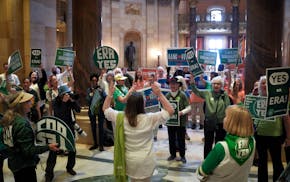Opinion leaders are often eager to share their plans for public policy or for how to spend state resources. Or so it used to be.
In the past, leaders recruited team members, colleagues, staff, volunteers and citizens to accomplish goals, even in a partisan atmosphere.
This open process was how the Legislative-Citizen Commission on Minnesota Resources (LCCMR) operated while managing the constitutionally dedicated Environmental and Natural Resources Trust Fund (ENTF).
Not so last week when Republican House Speaker Kurt Zellers unilaterally subjected the LCCMR to upheaval with the surprise decision to fire its director, Susan Thornton, without consulting the commission.
For five years, since citizen members were added to the commission, the nonpartisan LCCMR staff and appointed legislative and citizen commissioners had worked together in transparent public meetings to address critical environmental and natural-resource issues, ranging from invasive species to the decline of the moose.
The wide-ranging meetings were professional and informative, and were attended by most of the commissioners, most of the time. The subjects, presenters and the ensuing discussions employed an inquisitive, science-based approach, consulting the best minds in Minnesota.
That all changed in 2011 when the Republican majority took control.
In 2011, the House and Senate cut the staff and slashed the commission's recommendations by 30 percent, and the nonpartisan tenor turned partisan.
The new Republican leaders were commonly heard venting against dedicated funding and against citizen involvement and promoting their views opposing research and denying climate change.
Funding for environmental education was publicly degraded; some projects were referred to as just kids with watering cans. Citizen experts on the commission also came under scrutiny.
The science-denying tone was insulting to me and the numerous scientists who had been invited to participate in the public process.
As tensions mounted, attendance from legislative members dropped, and the planned meetings to discuss emerging issues or environmental accomplishments were never scheduled.
Repeated attempts to engage the new leaders in bettering the LCCMR were met with a total lack of communication.
Then, out of the blue, commissioners learned that their director had been fired just before Christmas so that House leaders could immediately change the course of the LCCMR.
The unauthorized firing ignored the adopted statutes and LCCMR procedures and provided a revealing look at the House leaders. The appointed commissioners are now excluded, and decisions are made behind closed doors among the majority caucus.
We can only guess what will happen next.
The speaker needs to honor the statutes and nonpartisan procedures that promote citizen participation and a knowledge- or science-based commission.
Even opinion-based leaders cannot expect professional citizen commissioners to acquiesce to a partisan, antiscience process just because the Republicans now rule the House and Senate.
To correct the errors, the speaker needs to refer all LCCMR personnel issues directly to the commission's executive committee, the House-Senate-citizen group responsible for LCCMR affairs.
Ultimately the speaker's ideas about the direction of the LCCMR should be brought to the commission or introduced as statutory changes; in these forums, the public can be assured that his ideas will be assessed in an open process.
All Minnesotans concerned with natural resources and the environment need to tell legislators that we won't support or contribute to a politicized, anticitizen, antiscience power grab of the LCCMR.
The commission and trust fund money should be off-limits to Minnesota's hyperpartisan politics.
* * *
Jeffrey S. Broberg is a Rochester-area geologist and president of the Minnesota Trout Association. He was first appointed to the LCCMR by Republican House Speaker Steve Sviggum and was reappointed by DFL House Speaker Margaret Anderson Kelliher. He serves as the House citizen appointee.

Readers Write: State flag, college sports, theft prevention
It's not funny: The disheartening state of creative and cultural nonprofits in Minnesota

Universities mirror society and the lack of trust in institutions


